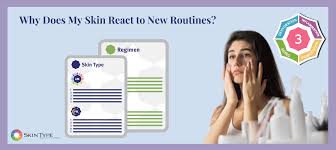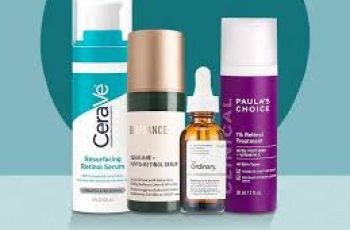
Skin reaction to a new product or new skin care routine
When starting a new skin care routine, you may suddenly experience a rash, tiny bumps, stinging, burning, redness or other unwanted skin reaction to a new cosmetic product. How do you know which skin care product is causing the problem? Is this an allergy or just a temporary irritation? How to know which product caused it? Our dermatologists are here to help.
skin reactions to new products and routines
What to do when you have a skin reaction to products
Our goals are to calm your skin as quickly as possible, help your figure out what caused the problem, and change your regimen to products that you can tolerate.
If you bought the products from Skin Type Solutions, let us know and we will give you a form to fill out. We track all skin reactions to products by skin type to help us give better skin care advice. Email us and we will return the product for a refund in most cases.
1. Stop using the products that caused the problem
If you are experiencing any irritation or reaction to products, stop any products with these ingredients:
AHA (Glycolic or other acids)
BHA (Salicylic acid)
Retinol
Vitamin C
Chemical sunscreens like methoxycinnamate
Stop using these until your skin feels normal. In the meantime use a soothing oil like Argan oil such as PAORR Argan Oil.
ClarityRx Glimmer of Hope Shimmering Facial Oil
$58.00
Add to Cart
Murad Multi-Vitamin Infusion Oil
$79.00
Out of Stock
Shea Terra MD 100% Pure Moroccan Argan Oil
$24.00
Out of Stock
PAORR By Zerafite Organic Moroccan Argan Oil
$22.75
Add to Cart
ClarityRx Glimmer of Hope Shimmering Facial Oil
$58.00
Add to Cart
Murad Multi-Vitamin Infusion Oil
$79.00
Out of Stock
Shea Terra MD 100% Pure Moroccan Argan Oil
$24.00
Out of Stock
PAORR By Zerafite Organic Moroccan Argan Oil
$22.75
Add to Cart
ClarityRx Glimmer of Hope Shimmering Facial Oil
$58.00
Add to Cart
Murad Multi-Vitamin Infusion Oil
$79.00
Out of Stock
Shea Terra MD 100% Pure Moroccan Argan Oil
$24.00
Out of Stock
PAORR By Zerafite Organic Moroccan Argan Oil
$22.75
Add to Cart
2. Restart One Product at a Time
Restart each product, one at a time. Use the moisturizer first. Wait 4 days to see if you react. If no reaction occurs, then add a second product. If you do react, then we know the moisturizer is at least one part of the problem.
Then skin care product that caused the skin to react is most likely the retinoid. For this reason you should restart the retinoid last. If you do restart the retinoid, make sure you are following these instructions.
Adding each product back in one at a time is the best way to find out which product is causing the skin reaction.
It is less likely that you have a true allergy to the skin care product-most reactions are irritations rather than a skin allergy, but it is possible.
Fragrances and preservatives are the most common causes of allergic skin reactions to products.
Other ingredients that cause a skin allergy can be found here.
Make sure you are using the right skin care routine for your Baumann Skin Type! Even using the wrong cleanser can cause your skin to react.
What skin type am I?
Contact a dermatologist for advice
If you bought your products from us, we are here to help. Email us at [email protected].
If not, you can find a medical provider in your area here.
If you cannot figure out what you are allergic to, dermatologists can do patch testing to find out.
“Why is my skin reacting to everything all of the sudden?
Once skin inflammation gets started from a new skin care product, other products in the skin care routine can begin to bother you – even products that did not cause you to get a rash before. This occurs because inflammation turns on other inflammatory pathways causing a domino effect.
This can make it hard to figure out which skin care product is causing the skin reaction to the new product. Make sure you are not using too many exfoliants and over exfoliating.
Any time you use the wrong skin care products for your Baumann Skin Type, you can get a skin reaction.
This is why we always recommend to shop for skin care by your Baumann Skin Type.
Take the Quiz
why does my skin react to new products
You should not have negative reactions to new products except in the case of retinoids like retinol.
Retinoids can cause:
redness
stinging
purging (breakouts)
peeling
tightness
If you get these reactions form retinoids, follow these instructions, and make sure you are only using the products in the skin care routine that we customized for you.
Th reason you should not mix our recommendations with other products we did not recommend is because, ingredients in products can affect the absorption of other ingredients or can change the chemical structure of other ingredients. So skin reactions to products can occur when they are not combined correctly in the skin care routine.
If you do have a reaction to a product that is not a retinoid it is caused by one of the following:
over exfoliation
using too much of an ingredient like an acid or benzoyl peroxide
allergy
chemical reaction between products
If you bought the product from us and cannot figure it out- we are here to help.
what are the most common irritants in skin care products?
The most common products that can irritate the skin when starting a new skin care regimen
When starting a new skin care routine- these are the skin care products most likely to cause skin reactions to products like skin irritation and rashes:
Retinoids like retinol
Alpha hydroxyacids or salicylic acid cleansers, serums, creams, pads
Vitamin C serum
Skin lightening serums for dark spots
Foaming cleansers can irritate dry skin or can irritate oily skin when used 2 times a day.
Exfoliants (over exfoliating)
Benzoyl peroxide
What is causing my skin reaction to products??
There are some clues to finding out why you reacted to a product. Dermatologists sometimes feel like a detective because we have to look at clues to figure out which product is causing the a skin rash. Here are the things we think about to solve the mystery:
Where is the skin reaction to the product?
Location matters!
Is the skin reaction in a sun exposed area? If so it might be a photoallergic reaction.
Does it have a pattern? For example does it follow the lines of clothing such as the waist bad of your underwear or the hook on your bra or where your glasses or earrings touch?
If so, you might have a nickel allergy (Hook or bra or earrings) or an elastic allergy (underwear).
If the skin reaction is to a new product, did it occur everywhere you applied it? Retinol allergies are most common around the nose, nasolabial folds and mouth.
A skin rash on the face is often caused by skin care products that have been used on the face in the area of the rash. A rash around the eyes is most often caused by nail polish. It is less common for a rash around the eyes to be due to an eye cream or serum.
Have you ever reacted to products before?
If you have a skin allergy then you may have reacted to this type of product before. The most common causes of skin reactions to products caused by allergy are preservatives and fragrances. You can find a list of allergens here. If you are allergic to formaldehyde, it can be tricky because this preservative goes by many names.
If you have not ever reacted to a product before, this may be an irritant reaction instead of an allergy.
We hope you found this helpful. if not, visit us on social media and ask us questions there.
And don’t forget- always shop for products and read reviews according to your Baumann Skin Type! Look for your colored octagon with your skin type number.


